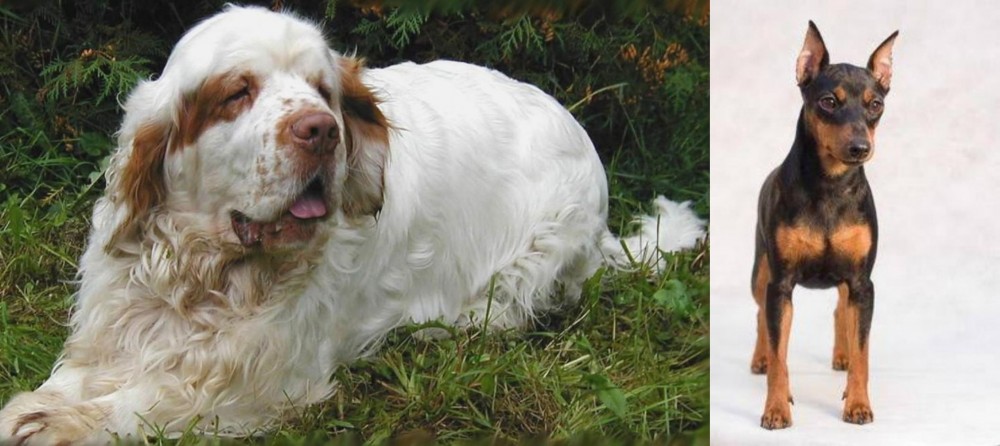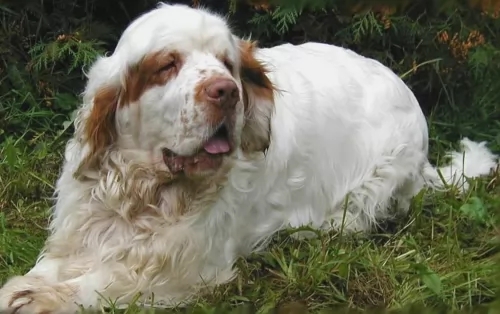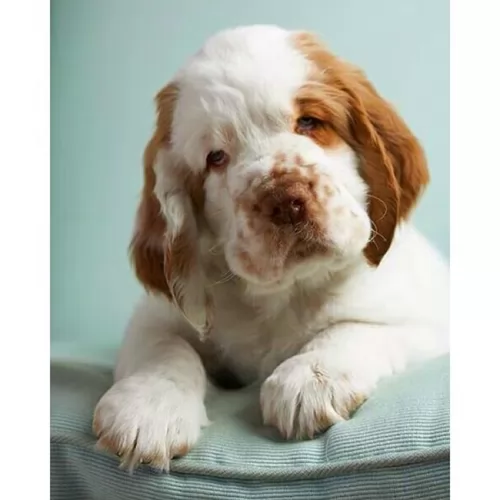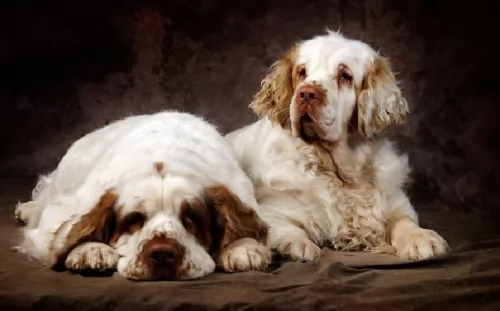 Petzlover
Petzlover Clumber Spaniel is originated from United Kingdom but Miniature Pinscher is originated from Germany. Clumber Spaniel may grow 21 cm / 9 inches higher than Miniature Pinscher. Clumber Spaniel may weigh 34 kg / 75 pounds more than Miniature Pinscher. Clumber Spaniel may live 3 years less than Miniature Pinscher. Both Clumber Spaniel and Miniature Pinscher has almost same litter size. Clumber Spaniel requires High Maintenance. But Miniature Pinscher requires Low Maintenance
Clumber Spaniel is originated from United Kingdom but Miniature Pinscher is originated from Germany. Clumber Spaniel may grow 21 cm / 9 inches higher than Miniature Pinscher. Clumber Spaniel may weigh 34 kg / 75 pounds more than Miniature Pinscher. Clumber Spaniel may live 3 years less than Miniature Pinscher. Both Clumber Spaniel and Miniature Pinscher has almost same litter size. Clumber Spaniel requires High Maintenance. But Miniature Pinscher requires Low Maintenance
 Ever since winning in Confirmation at Westminster Kennel Club’s annual show, the popularity of the Clumber Spaniel has increased markedly. The breed of Clumber Spaniel comes from the United Kingdom and it is the largest of all the spaniels. The breed is named for the Clumber Park where it was developed in Nottinghamshire. The Clumber Spaniel a=was designed to be a gundog or hunter in heavy weeds or cover. They have been popular with the Royal Family and were kept by King George V, King Edward VII, and Prince Albert.
Ever since winning in Confirmation at Westminster Kennel Club’s annual show, the popularity of the Clumber Spaniel has increased markedly. The breed of Clumber Spaniel comes from the United Kingdom and it is the largest of all the spaniels. The breed is named for the Clumber Park where it was developed in Nottinghamshire. The Clumber Spaniel a=was designed to be a gundog or hunter in heavy weeds or cover. They have been popular with the Royal Family and were kept by King George V, King Edward VII, and Prince Albert.
It is possible that during the French Revolution, the Duc de Noailles gave his spaniels to the Duke of Newcastle in Nottinghamshire, These spaniels, Alpine Spaniel, are extinct. At the time they were bred with Basset Hounds and Great Pyrenees.
Another line of thought has the Clumber Spaniel descending form an ancient Bleinheim Spaniel, which was used to later develop the King Charles Spaniel.
Whichever theory is true, we know that they were first bred and improved by William Mansell. They were shown in 1859 in England. They were bred almost exclusively by nobility until the mid-19th century. Then World War 1 caused all breeding to be discontinued and the number of Clumbers declined drastically, only to be redeveloped after the was by King George V.
The Cumber won Best in Show at the prestige’s Crufts 1991 Centenary Show. When the American Kennel Club recognized the Clumber Spaniel, there were only 9 other breeds officially recognized. They came to Canada in the same year of 1884. They are also recognized by the UK Kennel Club as a Vulnerable Native Breed. A Clumber bred by Doug Johnson won Best in Show at the 1996 Westminster Dog Show.
The Clumber Spaniel is a loyal, gentle soul who is not very friendly with strangers. They shed all the time and snore loudly.
 The Miniature Pinscher hails from Germany. It appears to be an ancient dog breed, going back hundreds of years and being used to kill vermin.
The Miniature Pinscher hails from Germany. It appears to be an ancient dog breed, going back hundreds of years and being used to kill vermin.
He is a distinct breed and much older than the Dobermann Pinscher. Development of this small dog started way back in 1895 when the Pinscher Klub was formed. It was renamed the Pinscher-Schnauzer Klub and the first breed standard was also written.
By 1929, the Miniature Pinscher Club of America was formed.
 The Clumber Spaniel is heavy-boned, with a very large head and a square muzzle. Of all spaniels, he is the biggest. His expressive face wears a dopey, sad look and his eyes are large, shaped like leaves. The muzzle is as large as the head and his nose is square. He has freckles on his muzzle and a deep chest. His legs are straight, and his feet are solid.
The Clumber Spaniel is heavy-boned, with a very large head and a square muzzle. Of all spaniels, he is the biggest. His expressive face wears a dopey, sad look and his eyes are large, shaped like leaves. The muzzle is as large as the head and his nose is square. He has freckles on his muzzle and a deep chest. His legs are straight, and his feet are solid.
The Clumber Spaniel gives off a dignified air and despite his expressions, he is ready to play or to work at any time.
 This bright, alert little dog stands at 25 to 30cm and weighs in the region of 3 to 5 kg.
This bright, alert little dog stands at 25 to 30cm and weighs in the region of 3 to 5 kg.
The body is lean and muscular with strong, straight legs. He has a short, sleek coat with no undercoat. The coat is black and tan, chocolate or a rusty shade. The ears are erect but sometimes they are half erect and half floppy, the little nose is black and the tail is usually docked. If you allow your Min Pin to breed, you can expect 2 - 6 puppies.
The Min Pin is a bright, feisty, alert toy breed, full of personality and full of spunk, making him an excellent watchdog too.
He isn’t aggressive towards his human family but he is full of attitude and can be aggressive with other dogs. He may be small but he isn’t a lap dog, being way too active for that, loving to be involved in a game or going for a walk.
He is loving with his human family, but training and socialization can make him a better pet, obedient and amicable. He is intelligent too so he learns easily. He gets along well with children but only when those children have been taught to be kind ad gentle with all animals, but particularly with teeny weenies like himself.
 The Miniature Pinscher is such a sporty, fun-loving, confident little dog that is also fearless for his small size.
The Miniature Pinscher is such a sporty, fun-loving, confident little dog that is also fearless for his small size.
He thinks he is a ferocious, big Dobermann Pinscher at heart and is ready to guard and protect his family with everything he’s got.
He is full of energy too and always ready for his daily walk and other forms of exercise and games.
He may be small, but he doesn’t want to be a lap dog, as he is too active for that. He can be highly entertaining and he promises to make you the most devoted and loving little family pet.
 The Clumber Spaniel can suffer from a variety of conditions due to its very design and genetics. Lameness early in life can be attributed to the large and fast-growing bones in the Clumber. This lameness will dissipate when the pup is fully grown. Other issues include:
The Clumber Spaniel can suffer from a variety of conditions due to its very design and genetics. Lameness early in life can be attributed to the large and fast-growing bones in the Clumber. This lameness will dissipate when the pup is fully grown. Other issues include:
Can become dehydrated and all the problems that arise from a dog being overheated and dehydrated.
Must have a caesarian section. They may also have a sensitivity to the anesthesia used in the procedure.
Hypothyroidism with ear and skin complications.
They cannot take sulfa drugs.
 Min Pins are robust little dogs and can enjoy good health when looked after properly. They can reach 15 years of age and even more.
Min Pins are robust little dogs and can enjoy good health when looked after properly. They can reach 15 years of age and even more.
Just like with any other dogs though, they’re prone to certain health conditions. Your Miniature Pinscher is highly unlikely to get any of these diseases, but it's good to be aware of some of them.
Progressive Retinal Atrophy, known as PRA for short is an eye disease where there is gradual deterioration of the retina. You will no doubt see your dog being affected with night blindness – not being able to find their way around as they usually do.
Legg-Calve-Perthes Disease is a hip joint problem that often affects toy breeds. The blood supply to the head of the femur is decreased and you’ll notice your pet limping. It’s not an ailment reserved for old dogs either but can be found in puppies that are just 4 months of age.
Hypothyroidism is a disorder of the thyroid gland and can lead to skin conditions with your dog as well as lethargy, hair loss and obesity.
 The Clumber has a tendency to gain weight and become obese. Feed them wisely. Feed about ¼ to ½ of a cup of high quality dry dog food twice a day.
The Clumber has a tendency to gain weight and become obese. Feed them wisely. Feed about ¼ to ½ of a cup of high quality dry dog food twice a day.
This can be cervical or spinal. The discs can be bulging or ruptured. Can lead to paralysis if not treated properly.
Entropion with inward rolling of eyelid or Ectropion with outward rolling of eyelid.
The Clumber Spaniel is not the most energetic of canines. He still needs moderate exercise daily but don’t overdo it. Walks, fetch, swimming, chase or confirmation are good activities for a Clumber.
 Grooming is easy and you will simply need to brush him twice a week as his coat is short and smooth. There is really no need to bath the Min Pin and you could even take a damp cloth and wipe him down to avoid using a shampoo which could dry the skin.
Grooming is easy and you will simply need to brush him twice a week as his coat is short and smooth. There is really no need to bath the Min Pin and you could even take a damp cloth and wipe him down to avoid using a shampoo which could dry the skin.
Always check his eyes and ears for infection and check for fleas and ticks too. His nails will need to be trimmed, more so if he doesn’t wear them down naturally.
Check your dogs teeth. Small dogs are more prone to dental disease and you want to brush his teeth 2 or 3 times a week with special canine toothbrush and toothpaste to avoid dental problems.
The amount your Miniature Pinscher eats will be determined by his age and his activity levels.
When you buy commercially manufactured food, you will need to buy food that is recommended for small, energetic dogs. You don’t want to feed your pet dry kibble day after day, so a tasty, nutritious treat is to add finely chopped up boiled chicken, brown rice of pasta and some cooked vegetables such as potatoes, carrots and spinach into his kibble.
All dogs, but particularly little dogs, love simple food that is consistent like what has been mentioned. They don’t do well on strange, exotic kinds of foods as it upsets the stomach. Make sure he has cool, fresh water available to him at all times, night and day.